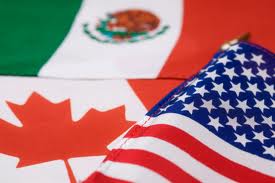NAFTA (North American Free Trade Agreement) is now 20 years old.
So, how well have the US, Canada and Mexico fared under North America’s equivalent to the European Union? Has NAFTA been a success or a failure?
Mexico, with its nationwide spread of Wal-Marts, Starbucks and an extremely broad range of consumer choice, is a very different country today compared to pre-1994, or pre-NAFTA.
Unlike the European Union, which dramatically raised living standards in Spain and Ireland, NAFTA failed on its promise to narrow the wage gap between Mexico and its two richer, northern partners (US and Canada).
Mexican economy benefited, but poverty remains high
While the introduction of foreign banks provided Mexicans with greater access to credit and the agriculture and electronics sectors grew, there have been hardly any benefits as far as wages are concerned. Unlike Brazil, which has seen a growing middle class and a reduction in poverty, Mexico’s middle class has grown, while poverty has remained largely unchanged.
The Economic Commission for Latin American shows Mexico’s poverty rate falling from 52.4% in 1994 to 42.7% in 2006, but rising again during the Great Recession to 51.3% in 2012. In the rest of Latin America poverty fell to 27.9% in 2013 compared to 48.4% in 1990.
USA Today quotes Alfredo Coutino, an economist at Moody’s Analytics who said “The benefits arrived, but perhaps not of the magnitude that had been hoped for. If this agreement had not been signed, Mexico would have been in a much worse situation than it has been over the last 20 years. Before, in Mexico, it was a question of social status to have a pair of imported sneakers, they were very expensive … now the majority of Mexicans can have these things that were once considered luxuries”
NAFTA has transformed Mexico from a debt-ridden state-dominated economy to a more open one with more low-paying jobs.
Canadian Manufacturing sees Mexico as by far the biggest winner after 20 years of NAFTA. The journal writes that over the last two decades “(Mexico has) emerged as a forward-looking country with expanding global reach, a handful of world-class corporations and a ballooning middle class.”
To a certain extent Ross Perot’s prediction that NAFTA would push jobs south of the border where labor costs were cheaper has occurred. Today Mexico’s exports are ten times larger than they were in 1994.
Jaime Serra Puche, who was the Mexican Trade Minister when his country joined NAFTA, said “I think NAFTA has been excellent for Mexico. Now with the reforms that are finally taking place I think we are going to gain competitiveness and the platform that has been constructed mostly for exports and manufacturing is going to become stronger.”
Over the last two decades, vehicle production has soared in Mexico and plummeted in Canada. Today 20% of automotive production in North America occurs in Mexico, while in Canada it has fallen to 16%.
Many economists say NAFTA has been overrated as the cause of Mexico’s opening economy. The country was already on the road to trade liberalization before joining the free trade area.

